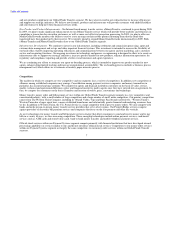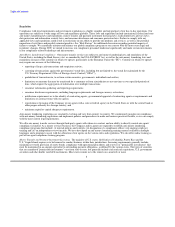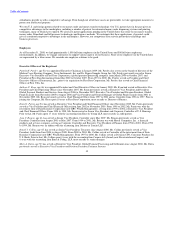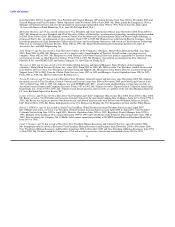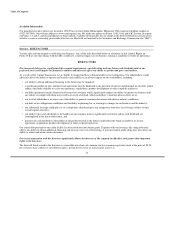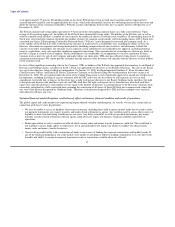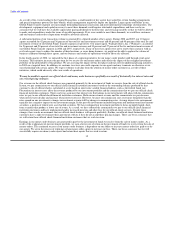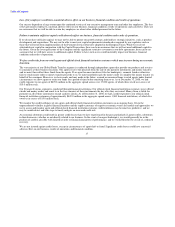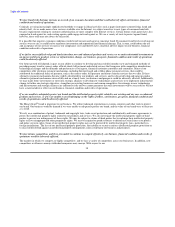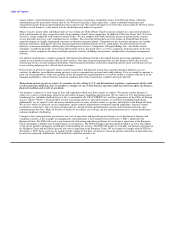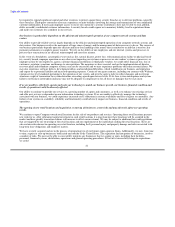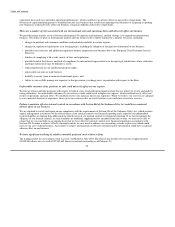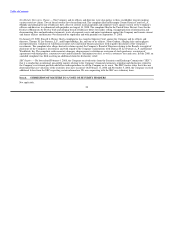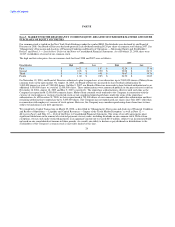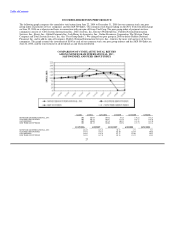MoneyGram 2008 Annual Report Download - page 20
Download and view the complete annual report
Please find page 20 of the 2008 MoneyGram annual report below. You can navigate through the pages in the report by either clicking on the pages listed below, or by using the keyword search tool below to find specific information within the annual report.
Table of Contents
Loss of key employees could have a material adverse effect on our business, financial condition and results of operations.
Our success depends to a large extent upon the continued services of our executive management team and other key employees. The loss
of key personnel could have a material adverse effect on our business, financial condition, results of operations and cash flows. There are
no assurances that we will be able to retain key employees or attract other skilled personnel in the future.
Failure to maintain sufficient capital could adversely affect our business, financial condition and results of operations.
If we do not have sufficient capital, we may not be able to pursue our growth strategy and fund key strategic initiatives, such as product
development and acquisitions. We may not be able to meet new capital requirements introduced or required by our regulators such as
those that will result from implementation of the Payment Services Directive adopted in the European Union. While we received
substantial new capital in conjunction with the Capital Transaction, there can be no assurance that we will not need additional capital in
the future. Given the leveraged nature of the Company and the significant restrictive covenants in our debt agreements, there can be no
assurance that we will have access to additional capital. Failure to have such access could materially impact our business, financial
condition and results of operations.
We face credit risks from our retail agents and official check financial institution customers which may increase during an economic
downturn.
The vast majority of our Global Funds Transfer segment is conducted through independent agents that provide our products and services
to consumers at their business locations. Our agents receive the proceeds from the sale of our payment instruments and money transfers
and we must then collect these funds from the agents. If an agent becomes insolvent, files for bankruptcy, commits fraud or otherwise
fails to remit money order or money transfer proceeds to us, we must nonetheless pay the money order or complete the money transfer on
behalf of the consumer. Moreover, we have made, and may make in the future, secured or unsecured loans to retail agents under limited
circumstances or allow agents to retain our funds for a period of time before remitting them to us. As of December 31, 2008, we had
credit exposure to our agents of $670.8 million in the aggregate spread across over 17,000 agents, of which three owed us in excess of
$15.0 million each.
Our Payment Systems segment is conducted through financial institutions. Our official check financial institution customers issue official
checks and money orders and remit to us the face amounts of those instruments the day after they are issued. MoneyGram is liable for
payment on all of those instruments except cashier's checks. As of December 31, 2008, we had a credit exposure to our official check
financial institution customers of approximately $449.0 million in the aggregate spread across 1,800 financial institutions, of which five
owed us in excess of $15.0 million each.
We monitor the creditworthiness of our agents and official check financial institution customers on an ongoing basis. Given the
unprecedented volatility in global financial markets and the rapid occurrence of negative economic events, the models and approaches we
use to assess and monitor agent and official check financial institution customer creditworthiness may become less predictive, and we
may be unable detect and take steps to timely mitigate an increased credit risk.
An economic downturn could result in greater credit losses than we have experienced in the past, particularly if agents suffer a downturn
in their businesses, whether or not directly related to our business. In the event of an agent bankruptcy, we would generally be in the
position of creditor, possibly with limited security or financial guarantees of performance, and we would therefore be at risk of a reduced
recovery.
We are not insured against credit losses, except in circumstances of agent theft or fraud. Significant credit losses could have a material
adverse effect on our business, results of operations and financial condition.
17


